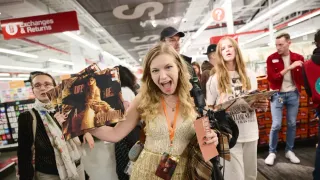November 5, 2014
Patrons Surprised at Lesbian Bar's Closure
Kilian Melloy READ TIME: 7 MIN.
The Lexington Club, known simply as the Lex, is more than just a bar catering to lesbians.
At the moment, for instance, it's also an art gallery. Work from multiple artists hangs on the cherry red walls. The exhibition, called "Baggage," was curated by Queer Cultural Center artistic director Pamela Peniston.
"Little did we know as we assembled the art for 'Baggage' - which partially addresses the changes happening in San Francisco and the shifting of the neighborhoods - that this would be our last show," Peniston said.
Nobody knew. Lexington Club owner Lila Thirkield announced October 23 via Facebook that after 18 years, the bar will shut down.
"I always felt like maybe we were exempt from what was happening in the neighborhood," said Lex employee Dean Bonilla.
"I could have been lying to myself. I didn't want to ever think that this place that I love so much would ever be taken away from me. Even though I've been evicted from this neighborhood a couple years ago, losing a bar almost feels a little worse than just being evicted from my home. Because it's a community space, it's a staple for our community," Bonilla said.
The week before the announcement, Professor Nan Alamilla Boyd was teaching her San Francisco State students about the Lexington Club. They were discussing "Boys of the Lex," an essay about gender identity by Gayle M. Salamon.
"That's what's really so wonderful and vital about the Lex, say, as opposed to Wild Side West or other spaces. You see that kind of resistance, gender transgression as part of the fabric of its queerness," Boyd said.
Lesbian-owned Wild Side West is a Cortland Avenue neighborhood bar with its own unique history. But it doesn't serve the same community as the Lex.
As one frequent Lex patron, Christina Green, explained it, "One of the main differences is the age difference between the two. Without the Lex, the younger queer scene will have nowhere to hang out."
Other bars, like El Rio and the neighboring Virgil's Sea Room, where Thirkield is a part owner, are reliably queer-friendly. But the Lex is the last unambiguously lesbian bar.
Boyd, who wrote the book on the history of queer bars in San Francisco (literally - it's called Wide-Open Town: A History of Queer San Francisco to 1965) says she is often asked how the Lex became the last of its kind.
"The big question for the last 15 years, whenever I do a talk anywhere, is why is there only one lesbian bar in San Francisco?" Boyd said.
"Now with the closing of the Lex, the question gets a little bit more pointed," she said. "Well, what now? There's not even one designated seven-day-a-week space."
For many, that question is hard to bear.
"I'm just totally heartbroken," said queer porn icon Courtney Trouble. "I've been going to the Lex for 10 years. Me and my partner had our first kiss on their sidewalk. My first DJ gig was there. I shot my first porn film on their pool table. I don't know what else is even left of San Francisco."
The Lex is the land of a thousand queer girl 21st birthday celebrations. It's committed to absent cover charges and abundant cheap drink specials, including the notorious penny shot. It hosted some of the best Folsom Street Fair parties, some of the best Halloween parties, and the only Pride waffle brunch. It has a strict pro-puppy policy.
The spirit of the Lex has reached far beyond its doors. Sarah Marloff, a former Lex regular who now throws queer parties in Austin and Washington, D.C., said she takes inspiration from Lex parties.
"I think the Lex definitely left a mark. Their events always being free, the dive bar feel. I try to give my parties a similar feel," Marloff said. "The Lex always seemed like where the magic started."
For many, that magic had to do with meeting some of the most important people in their lives at the Lex.
"Some of my favorite memories at the Lex are based around meeting my present day best friends," said Estella Barboza, bassist and guitarist for local punk band No Bone. "There have been nights at the Lex where a song like Journey's 'Don't Stop Believing' will come on and the entire bar would sing along, which is exactly as cheesy as it sounds."
No Bone's vocalist Adrienne Elias said she spent a lot of time at the Lex in her early 20s. "My bandmate and I would go and drink whiskey and write lyrics on napkins," Elias said. (The lyrics were for a previous band, Lazy Tops).
"It's a shame that this safe space has to close down. It is not the first and will not be the last. I only wish it felt as if we could rally together and save the Lex. Keep this li'l haven of ladies, for the ladies and serving the ladies," Barboza said.
This haven has been critical for Bonilla.
"In Florida, I got constantly harassed being in public for looking different. I was tired of constantly having to defend myself for just being me," said Bonilla, who hails from Jacksonville.
Moving across the country didn't shield Bonilla from mistreatment.
"I identify as genderqueer, so in a way it's really hard for me. Even in San Francisco I still get harassed by people," Bonilla, who prefers gender-neutral pronouns, said. But it helps, they said, "just to know that I can go to this bar and not have random guys asking me what my gender is or yelling at me because I look like a dude. I go in there and I don't have to worry about that, zero percent, at all."
Partly, Bonilla said, the Lex maintains this rare sense of security because "we watch each other's backs."
Bonilla took a job as a door person at the Lex last month, and has dealt consistently with people who try to harass patrons.
"Every time that I've worked there, there's been at least one random guy that was asked to leave. For either calling women bitches, or talking about their parts of their body, or touching them inappropriately," Bonilla said.
Bonilla isn't sure where they'll go to relax, unwind, and meet up with friends without the comfort of the Lex, where they know that staff and other customers will protect each other from potential hostility.
"I go there and I feel completely comfortable," Bonilla said. "And I don't feel that way going to other bars. I go into a random bar in the Mission, and I'm getting stared at."
Bridging the Trans Divide
Boyd said that this safe space for gender variance is part of the Lex's unique place in queer and feminist history.
"A lot of the early lesbian, trans community formation was in opposition. There was this turf war about it," Boyd said. "The Michigan Womyn's Music Festival is emblematic of that political contest over territory, different queer territory. But the Lex was a place where that didn't happen ... a lot of queer women's spaces were inhospitable to the trans community. The Lex bridged that somehow, in a seamless way."
Trouble attributes this success in large part to Thirkield.
"Lila has always warmly welcomed all kinds of queers into that space to explore, create, experiment, radicalize our personal experiences," Trouble said. "What it means now is SF has no central space for queer- and feminist-specific social organizing, that's free and always open to us."
Besides providing a set for her first film, the Lex has supported Trouble in other ways, including hosting a fundraiser for her website queerporn.tv. Benefits and fundraisers are common at the Lex. When Lyon-Martin Health Services, a longtime provider of queer friendly health care, faced closure, the Lex helped out with a fundraiser. When the late, great Lusty Lady needed funds, they held a benefit at the Lex.
But now that community is fractured. In Thirkield's announcement, she wrote that much of her client base has moved to Oakland. In addition, Thirkield wrote, in recent years her rent had been raised to market rate. She declined to be interviewed for this story.
Thirkield has already found a buyer, and sources close to the bar say that the paperwork between Thirkield and the buyer, who has not been identified, is "being finalized."
But Thirkield will retain the name of the Lexington, and host parties and events under that name in other bars and clubs that have managed to hold on.
"The Lex closing is yet another round of something that's been going on for 10 years. I lived in the Mission since 1988. There was a pretty vibrant dyke community there. That community has really been priced out," said Zeph Fish, whose art currently hangs in the Lex. "It's another symptom of what we all know is going on. The demographics are really shifting geographically. I think the Lex is the last really public lesbian institution in the neighborhood."
Fish's series, "Signs of the Times," which is on display on the Lex's south-facing wall, is a favorite of Bonilla's. It reached new levels of poignancy, Bonilla said, when they learned the bar was closing.
As Bonilla described the spray paint prints: "There are these suitcases, and one suitcase is an actual house. Like they're picking up a suitcase and walking away with everything they have in their house. And that really connected to me a lot. Because that's what's happening in this neighborhood. To so many of us."
For now, the art is still up. The Lex is open, and will be until after New Year's. The Lex is still supporting a community to a degree so unique, it's taught in schools. The Lex has claimed its place in history.
And even when it closes - when the Lex is just a memory of a bar - it will still be so much more than that.






